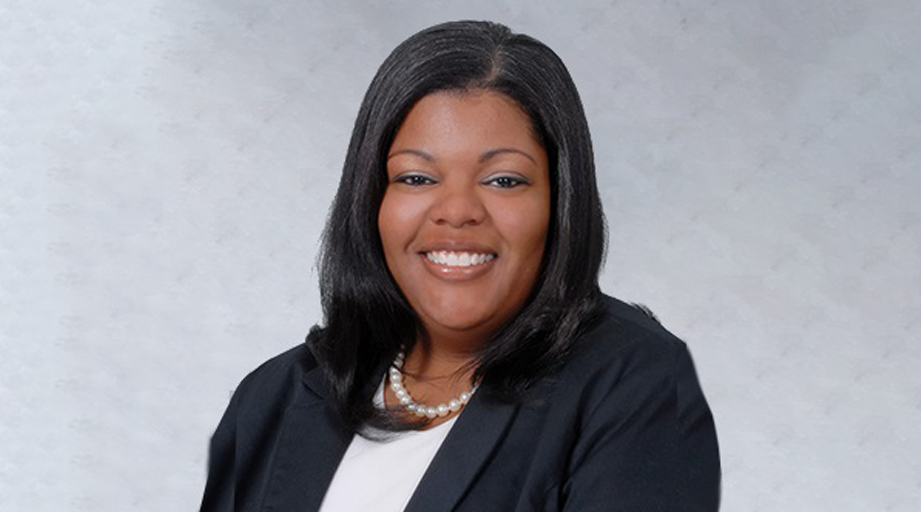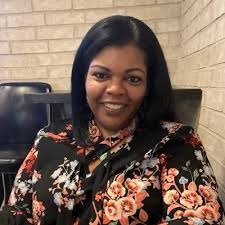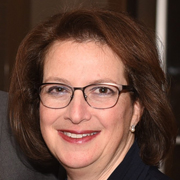
SOMETIMES, LIFE TAKES MANY TURNS. Just ask Lanita White, Pharm.D. As a teenager, Dr. White had a plan. Inspired by a favorite cousin, she was going to follow in the same footsteps: Study computer science in college, then head to Houston to work for NASA, where her cousin had worked on the space shuttle program.
"I quickly found out I was horrible at [computers]," recalls Dr. White, now assistant dean for student affairs and an associate professor of pharmacy practice at the University of Arkansas for Medical Sciences (UAMS) College of Pharmacy, in Little Rock. When her studies weren't going well, her mother suggested she consider pharmacy and put her in touch with a pharmacist friend.
Pharmacy Inspiration
Growing up in the small town of Hammond, Louisiana, Dr. White said the only pharmacists she saw were older white males working in neighborhood drug stores. "I didn't know any Black pharmacists, let alone female pharmacists," she said. But shadowing her mother's friend, who worked alongside physicians tailoring medication regimens for adults with disabilities at a human developmental center, she became inspired.
"I fell in love with the things that she was able to do as a pharmacist, and it opened my eyes to the possibilities of the profession," Dr. White said. At that point, she made some moves toward going to pharmacy school and adjusted her plan. She would still go to Houston after graduation and work in a retail pharmacy.
A Great Clinical Mind
Things changed again during her fourth year of pharmacy school at Xavier University of Louisiana in New Orleans when Hurricane Katrina devastated the city. Students had the month of September off while the administration tried to determine how to keep education going for its students. Dr. White was supposed to rotate through community pharmacy settings, but when school resumed, she found herself enrolled in an oncology setting. A few weeks in, Dr. White's professor and preceptor told her she had a great clinical mind and should consider a pharmacy residency.
Dr. White wasn't sure residency was for her, but she and a friend jetted off to the ASHP Midyear Clinical Meeting in Las Vegas to check out the ASHP Residency Showcase. A former classmate suggested she talk to the Veterans Administration (VA) hospital in Little Rock. Returning home, Dr. White told herself she would only apply to that one program, and if she didn't get an interview, she would continue her path to community pharmacy. She got the interview. Then, the day of her interview, it started snowing so badly at lunchtime that everyone was released to go home, and her afternoon interviews were canceled. Dr. White took that as a sign it wasn't meant to be, but she matched anyway.
"I'm doing a residency!" Dr. White said she told herself. "I couldn't believe it." It was her stepping stone toward a successful academic career. She enjoyed a diabetes and endocrinology rotation during residency so much that she stayed on with the VA, completing a second-year residency specialty program in ambulatory care. A few months later, her dream job opened in the diabetes and endocrinology clinic. She applied and got the job.
Interprofessional Clinic
Three years later, UAMS, which partnered with the VA, contacted her about a unique opportunity. An old pharmacy had been donated to the school. They wanted to convert that facility to an interprofessional clinic to allow students to see patients in their historically underserved neighborhood. They asked Dr. White to become its founding director. At that point, she was on the executive career track at the VA but agreed to put in a letter of intent just in case. Of course, she got the job.
For six years, Dr. White enjoyed overseeing pharmacy, medical, nursing, public health, and other graduate students providing free health screenings and health management services for community residents, who were largely African American and Hispanic. She loved every minute.
"When we graduate students and put them in a clinic or hospital, and tell them to work as a team, they often have no background for that…or an appreciation for what other professions do," she said. "The 12th Street Health and Wellness Center really helps them to understand that process, roles and responsibilities, ethical issues, and things of that sort. It's one of the things I am most proud of. We helped so many people."
Pharmacy Leadership
Noting Dr. White's great work with students, the UAMS College of Pharmacy leadership in 2018 asked her to apply to the assistant dean of student affairs job. She's been there ever since, shepherding some 390 students through the curriculum, from start to graduation. Sometimes, students feel that faculty aren't people they can approach, Dr. White said, but she enjoys being open to clear and frank conversations.
"The biggest lesson I try to impart to students is the ability to listen and be compassionate," she said. "If you can listen to a person with a compassionate ear, you hear so much more. You hear the real issues that are going on, that they may or may not verbalize to you. You understand the struggles, and you can see reasons that we sometimes just blow off as, 'Oh, they're not adherent,' or 'They just don't want to do this.' Everything else falls in line behind that."

administer COVID-19 vaccines in her
community
Giving Back to her Community
When she's not teaching, Dr. White enjoys giving back to the profession and her community. Most recently, she has volunteered to administer COVID-19 vaccines and gave talks about the SARS-CoV-2 virus and the vaccine to religious audiences and business communities.
Disparities are still seen in Black and brown communities, she said, tied to multiple factors, including socioeconomic status, education, and healthcare resources. One of the most startling has been with COVID-related deaths.
"We have a vaccine that we believe is highly effective in preventing the most serious side effects from COVID-19, and we need to make sure that it is widely available, especially to communities that are most affected by the worst outcomes," Dr. White said. "Our job as minority professionals in health care is to educate people, help them to get all the credible information they can about the vaccine, help them be confident in it and understand the importance of it so that we can save lives."
ASHP DEI Task Force
In 2020, Dr. White was selected to serve on ASHP's Task Force on Racial Diversity, Equity, and Inclusion, where she said she enjoyed being part of a group that was passionate about making sure the organization truly represents its members. Dr. White said she had seen several females in leadership positions but not many people of color. Task force members discussed how to get diverse leaders more involved in the organization and apply to board positions. It can be daunting to apply for leadership roles, Dr. White noted, especially if you don't see yourself represented by the group.

It's important for us as current leaders to say, 'How do we bring the next generation forward? How do we get people involved,'" said Dr. White, noting the group had many conversations about how to mentor and welcome new faces to participate. "You have to demystify it in some way. That's why that part is extremely important to me. When we start looking at our leadership, the more diverse it is and the richer the conversation is, the more quickly we can start to see change."
Cindy Stowe, Pharm.D., dean of the UAMS College of Pharmacy, said she's had the pleasure of watching Dr. White's career develop over the years and seeing how students flock to her. "What's striking about Lanita is that she's not risk-averse," said Dr. Stowe, an ASHP member. "She's willing to take on new challenges. She contemplates and thinks things through, doesn't get rattled, and makes good decisions, which I think are all strong attributes that make her a natural leader. As assistant dean, she has to wear a lot of different hats. I think she does a phenomenal job of caring for the people around her and the students most significantly."
Dr. Stowe said she was particularly impressed that Dr. White took on the task of developing the 12th Street Health and Wellness Center, which shined a light on her passion for helping the community and will have long-lasting effects on her career. "She's called upon to lead and represent in lots of different venues," Dr. Stowe added. "That's a testament to her maturity and professionalism, and how her experiences have shaped her ability to articulate a vision and commitment to long-term change."








